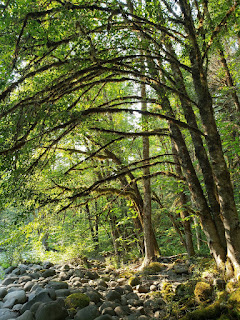What type of eco-tourist are you?
 Ecotourism is more than a style of vacation. Ecotourism is
nature-based travel that empowers local communities, conserves natural
resources, is sustainable, and supports conservation efforts. Ecotourism
destinations are natural environments, sometimes with threatened biodiversity
or wildlife, in which one enjoys the spender of nature.
Ecotourism is more than a style of vacation. Ecotourism is
nature-based travel that empowers local communities, conserves natural
resources, is sustainable, and supports conservation efforts. Ecotourism
destinations are natural environments, sometimes with threatened biodiversity
or wildlife, in which one enjoys the spender of nature.
Although all ecotourist have a strong environmental
commitment there are several key differences, which separates them into two
groups: hard-ecotourist and soft-ecotourist. Do you prefer small groups, seek
physical activity and challenge, do not require services (restaurant, hotel,
public toilet), and interact deeply with nature? Then you are considered a
hard-ecotourist. Do you prefer guided walking tours, bus and train tours,
require services, and desire less interact with nature? Then you are considered
a soft-ecotourist. Of course, it is possible to be a blend of both types. One
thing hard-ecotourists need over soft-ecotourists is knowledge of basic camping
skills (i.e. tent set-up, using a camp stove) and basic First Aid.
 There are benefits to both groups. Soft-ecotourists take
guided tours to become informed on the destination. Soft-ecotourists enjoy the
comforts of amenities, such as camping in a cabin or yurt and eating at the
lodge’s restaurant. Soft-ecotourists enjoy experiencing nature from a distance,
for
There are benefits to both groups. Soft-ecotourists take
guided tours to become informed on the destination. Soft-ecotourists enjoy the
comforts of amenities, such as camping in a cabin or yurt and eating at the
lodge’s restaurant. Soft-ecotourists enjoy experiencing nature from a distance,
for instance a jeep ride through an animal preserve. This way the ecotourist enjoys nature yet is not directly in contact with the natural elements.
The benefits enjoyed by hard-ecotourist include the freedom
to explore nature without guide restraints and timelines. The hard-ecotourist
enjoys hiking, kayaking, biking, rock-climbing in other words physical activity
and physical challenges. This freedom to explore also feeds the hard-ecotourist
desire to rough-it with no services. Hard-ecotourist enjoy camping in
un-designated areas either in a tent, hammock or under the stars and find
pleasure in cooking food over a camp stove or campfire. All of the above, is
how a hard-ecotourist becomes deeply interactive with nature.
As there are benefits, there too are negatives associate with both hard-ecotourist and soft-ecotourist. Hard-ecotourists typically do not desire traveling with a tour guide. Although there are often informational kiosks at most major nature-based attractions, they do not have the advantage of being about to ask the tour guide questions. Hard-ecotourists take more of a risk. They are at the mercy of the elements and have nowhere to seek shelter other than what they have brought with them if the weather were to turn cold or it were to begin raining.
 There are negatives associated with being a soft-ecotourist
as well, such as using more resources (i.e. electricity in a cabin, fuel
associated with a guided tour, and materials to maintain services). Additionally, soft-ecotourists do not have as deep of an interaction with nature
since they are often taking guided transportation and sleeping indoors.
Soft-ecotourists, if attending a guided tour, are restricted to the tour schedule
and may not have the opportunity to explore nature at their own leisure.
There are negatives associated with being a soft-ecotourist
as well, such as using more resources (i.e. electricity in a cabin, fuel
associated with a guided tour, and materials to maintain services). Additionally, soft-ecotourists do not have as deep of an interaction with nature
since they are often taking guided transportation and sleeping indoors.
Soft-ecotourists, if attending a guided tour, are restricted to the tour schedule
and may not have the opportunity to explore nature at their own leisure.
Regardless of what type of ecotourist you are, one thing
remains the same – your desire to explore and connect with nature. Ecotourists are mindful that traveling puts a strain on our natural resources and
environmental health and want to make a positive impact in the traveling
industry.
Travel near or travel far just remember to travel light and leave no
trace.




Comments
Post a Comment